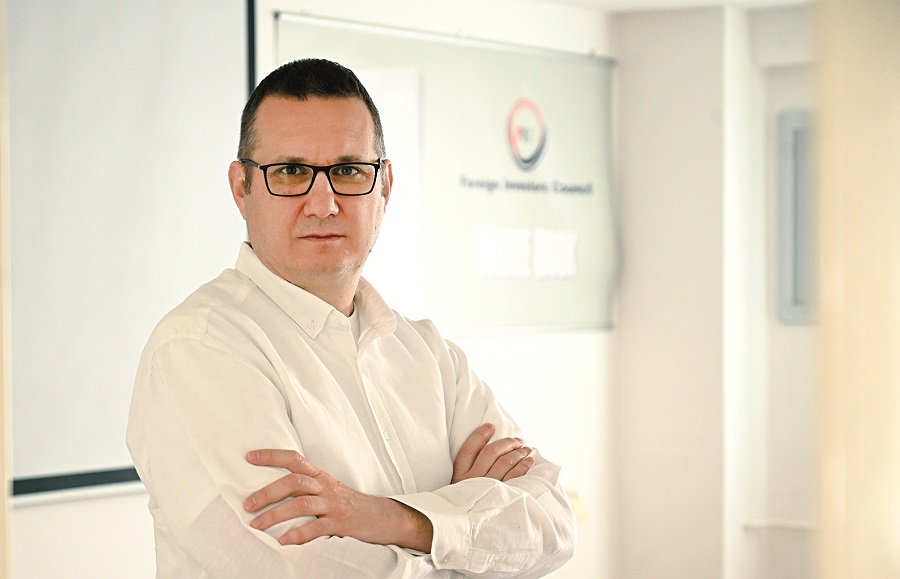Aleksandar Ljubić, FIC Executive Director
Our Commitment to Digitalisation Proved to be Right

The pandemic has shown the importance of digitalisation, not only in the financial sector, but rather also in all other sectors in which the digitalisation of operations will enable easier and more efficient work. The FIC, through our network of member companies, will support the educating of citizens to ensure that digital solutions are equally available to all.
Next year will mark two decades since the founding of the Foreign Investors Council. And, judging by news posted on the FIC website, the FIC has continued to gain new members even during this time of the COVID-19 Pandemic. Here we discuss what’s new in the work of the Council’s Executive Office and its plans for the future with FIC Executive Director Aleksandar Ljubić.
How many companies are FIC members today?
The number of members of the Foreign Investors Council increases every year, and that is certainly something that fills us with pride, but we are even more satisfied with the fact that we are, alongside state institutions, one of the first addresses that potential new foreign investors in Serbia turn to. In the countries in which they operate, they are referred to us because we bring together a large community of over 120 companies that have invested over 36 billion euros and employ more than 100,000 people, which ensures that they feel well received in our company and that they know that they can rely on our knowledge resources.
Compared to 2020, how has the work of your office changed in 2021, in the sense of the main areas of support to your members?
The main objectives of the FIC during last year were to ensure the health and safety of employees, maintain the continuity of operations and enable companies to adapt quickly and efficiently to the new circumstances. The most important task of the executive office was to provide them with support in all activities. We are still in a state of increased readiness and are prepared to leap to the aid of every member.
However, this year we’ve more or less returned to normal life and regular FIC activities. While the 2020 White Book dealt with the impact of COVID-19 on all relevant regulatory areas, this year our most important publication will once again contain recommendations for improving the business climate, with specific proposals for resolving burning issues. We experienced a major shift in 2019, because 40% of our recommendations were implemented, while this year we’ve set the goal of half of the recommendations provided being adopted. And if we don’t succeed in fully achieving this goal in 2021, we believe that we will continue working successfully with the Government of Serbia on the building of a predictable business environment and digitalisation, which remains our key topic.
Last year gave us the opportunity to see how important digitalisation is in many areas of social life and how important it is to eliminate existing bottlenecks. We worked a lot with the Government of Serbia and the National Bank on solutions such as the digitalisation of bills of exchange, the introduction of video identification, the implementation of signatures in the cloud and other significant solutions that have proven to be extremely important, particularly during a pandemic. The Office for Information Technologies and eGovernment and the National Bank of Serbia have done an excellent job of introducing these kinds of solutions. We have now added the digitalisation of healthcare to our priorities. Of course, we will also continue working on other topics that have traditionally been in our focus.
It was precisely during moments like that of the outbreak of the pandemic that the corporate qualities of large multinationals and their awareness to selflessly share experiences, particularly in the field of healthcare, were shown
On the basis of the summary of the FIC Assembly regarding the association’s key achievements, as well as the list of activities in 2021, it seems that digitalised communication has increased the efficiency of the Council’s communication with stakeholders and the public. What are your observations from practise?
FIC members are present across all parts of the country, which is why – long before the outbreak of the pandemic – digital solutions imposed themselves as an excellent opportunity for us to maintain intensive communication between members who are working, through eight committees, on proposals for improving legislative solutions in numerous areas. From our own experience of the work of the Council, it was clear to us that digitalisation has far-reaching and positive repercussions for society. In the period ahead, through our network of members, we will focus in particular on the popularisation of digitalisation and educating citizens to ensure that digital solutions are available to all equally.
You represent the FIC in the Government’s Working Group tasked with advancing the Law on Electronic Communications and the Government’s Council for Encouraging the Development of the Digital Economy, Innovation, High-Tech Entrepreneurship and Digitalisation. What are the key topics for the FIC?
Alongside the development of road infrastructure, which is progressing well and opening up some parts of Serbia that were inaccessible until yesterday, the construction of “digital highways” is extremely important for foreign direct investments and further economic development, in order for more capital-intensive investments to be able to come to Serbia.
The example of the introduction of “green corridors” with the help of the use of the Electronic Data Exchange System between customs administrations within the scope of CEFTA, which the Delegation of the European Union worked on with huge support from the FIC, showed the importance of the free movement of goods, and we hope that they will also continue to thrive after the pandemic.
We are currently working with the Ministry of Finance and the Customs Administration on various modules within the multi-year process to develop the National One-Stop Shop System, which – when completed in five years – will connect all participants in foreign trade exchanges, including both state bodies and the business community, and which has the end goal of creating more efficiency in the implementing of foreign trade exchanges and European integration.
Alongside the Government of Serbia, the FIC represents one of the first addresses that potential new foreign investors in Serbia turn to, as they see our business association as an experience and knowledge resource
Apart from cooperating on various government initiatives, which stakeholders and topics have been in your focus during 2021?
During this period, we have been focused in particular on cooperation with the Government of Serbia, but we’ve additionally also continued maintaining good relations and cooperation with the academic community and other business associations, such as AmCham, NALED and the Serbian Chamber of Commerce. We each have our own priorities, and ours is certainly digitalisation and all associated processes.
What has changed when it comes to the internal organisation of your work and which modalities of digital cooperation will you retain when the pandemic ends?
As an organisation, we will continue using and developing digital tools that allow us to communicate quickly and reliably, but we will certainly also foster a hybrid model of work that provides us with the opportunity to nurture all forms of exchanges of opinions between members.


